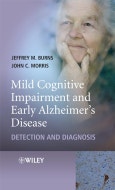Beautifully presented in full colour, Early Diagnosis and Treatment of Mild Cognitive Impairment includes case studies and discusses future therapeutic and diagnostic strategies. It is an invaluable resource for postgraduates and professionals, for specialist physicians in neurology and psychiatric medicine, geriatric medicine and general practice.
Table of Contents
1. Introduction.What is mild cognitive impairment?
Epidemiological studies of MCI.
The border zone between aging and dementia: cognitive and neuropathological changes.
Aging and cognitive performance.
2. Neuropathology of Alzheimer’s disease, non-demented aging and MCI.
Histopathological features.
Plaques.
Neurofibrillary pathology.
Neuronal loss.
Topography of neuropathological changes.
Neuropathological AD diagnosis.
Neuropathology of aging.
Neuropathology of MCI.
Does a subset of MCI patients actually have early Alzheimer’s disease?
Clinical studies.
Neuroimaging.
3. Detecting and diagnosing MCI and early AD.
Early detection.
Recognition of MCI and early AD.
Informant-based history.
Neurological examination.
Laboratory and radiological evaluation.
Psychometric/mental status testing.
Dementia-screening instruments.
Mini-mental state examination.
Clock-drawing test.
Seven-minute screen.
Dementia staging instruments.
CDR.
Global deterioration scale.
4. Etiology of MCI: differential diagnosis.
“Worried-well”.
Depression.
Other etiologies.
Neurodegenerative dementias.
Overlap disorders.
Dementia with Lewy bodies.
Vascular dementia.
Frontotemporal lobar dementias.
Identifying the subset of MCI that is AD.
5. Treatment of MCI and dementia.
MCI.
The case for early treatment.
Non-pharmacological treatment.
Dementia therapy.
Approved therapies.
Cholinergic hypothesis.
Cholinesterase inhibitors.
Donepezil.
Rivastigmine.
Galantamine.
Memantine.
Agents under investigation for AD treatment and prevention.
Vitamin E and selegiline.
Estrogen.
Anti-inflammatory agents.
Cholesterol-reducing agents.
Chelation therapy.
6. Future therapeutic and diagnostic strategies.
Amyloid hypothesis.
Secretase inhibitors.
Amyloid vaccine.
Potential biomarkers.
CSF biomarkers.
CSF amyloid beta (Aβ).
CSF tau.
CSF sulfatide.
CSF markers of inflammation.
CSF markers of oxidative stress.
Serum biomarkers.
Structural imaging.
Functional neuroimaging.
PET and SPECT.
Functional MRI (fMRI).
Imaging amyloid.
Genetic testing.
Early-onset familial AD.
Amyloid precursor protein.
Presenilin genes.
Late-onset AD.
Apolipoprotein E.
7. Case studies.
Case report 1: MCI as early-stage Alzheimer’s disease.
Comment.
Case report 2: Diagnosis of dementia prior to impairment sufficient for MCI.
Comment.
Case report 3: Memory complaints associated with non-demented aging.
Comment.
References.
Index.








